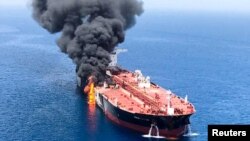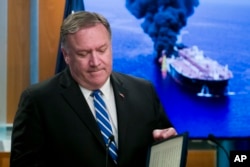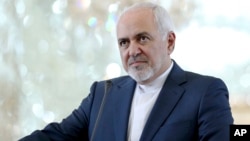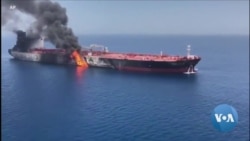The U.S. Navy has released video it says shows an Iranian patrol boat removing an unexploded limpet mine from the hull of one of two tankers carrying petroleum products that were attacked in the Gulf of Oman Thursday.
One of the tankers is Norwegian-owned, and the other is owned by Japanese Kokuka Sangyo shipping company.
Photographs also released by the U.S. military show the removed mine had been attached to the Japanese tanker, slightly forward of a mine that had exploded.
The Norwegian tanker was set on fire and sent up smoke thick and black enough to be seen by satellites in space.
The head of the Kokuka Sangyo shipping company, which operates the tanker Kokuka Courageous, said the ship had been attacked twice, with one explosion near the engine room and another on the right-hand side, near the back.
Speaking to reporters Friday, Yutaka Katada, said the crew of the vessel reported they saw a “flying object” just before the second blast on board, suggesting the tanker was not damaged by mines.
Katada’s statement contradicts the U.S. account of the incident.
Pompeo blames Iran
U.S. Secretary of State Mike Pompeo is blaming Iran for the attacks, which took place off the Iranian coast.
“It is the assessment of the United States government that the Islamic Republic of Iran is responsible for the attacks that occurred in the Gulf of Oman today,” Pompeo said. “Taken as a whole, these unprovoked attacks present a clear threat to international peace and security, a blatant assault on the freedom of navigation, and an unacceptable campaign of escalating tension by Iran.”
Pompeo said the U.S. based its determination that Iran was behind the attacks on intelligence, the weapons used, and what he calls the “level of expertise” needed to carry out such an operation.
The secretary noted that Iran was behind other recent similar attacks on shipping and that no proxy group in the region has the resources and ability to attack a tanker with such a “high degree of sophistication.”
Iran calls timing ‘beyond suspicious’
Iranian Foreign Minister Javad Zarif said the timing of the latest apparent attacks was “beyond suspicious” because Japanese Prime Minister Shinzo Abe was in Tehran meeting with Supreme Leader Ayatollah Ali Khamenei. Their talks focused on ways to de-escalate tensions between Washington and Tehran.
But Pompeo said the Iranian government insulted Japan by striking one of its tankers while Abe was in the country.
WATCH: Pompeo Blames Iran for Tanker Attacks
'Lots of indications' it's Iran
A U.S. defense official, speaking to VOA on condition of anonymity, said the military has “a lot of indications” Iran attacked the ships.
“We’re confident, and there is evidence available,” the defense official said.
The official would not elaborate on what the evidence entailed. This is the latest of many attacks in the region that the U.S. has accused Tehran of carrying out but has yet to declassify any incriminating evidence.
Both ships were struck at dawn Thursday by what U.S. military officials believe were mines.
The U.S. Navy’s Bahrain-based U.S. 5th Fleet received distress calls from both stricken tankers about an hour apart.
A U.S. Central Command spokesman said the USS Bainbridge guided missile destroyer provided immediate assistance to the Japanese vessel. Twenty-one crew members from that ship are now aboard the Bainbridge.
A defense official confirmed to VOA that crew members from the Norwegian ship are in Iranian custody. Iran’s state-run IRNA news agency reported that Iran’s navy rescued 44 crew members from the tankers.
U.S. President Donald Trump tweeted that while he appreciates Prime Minister Abe’s efforts to calm tensions with Iran “that it is too soon to even think about making a deal. They are not ready, and neither are we!” Trump said.
U.S. Ambassador to the United Nations Jonathan Cohen condemned the attacks during a Security Council meeting about the region, saying it is “unacceptable” for anyone to attack commercial shipping. He said Thursday’s incident raises “very serious concerns,” and that the United States is continuing to assess the situation.
U.N. Secretary-General Antonio Guterres stressed the importance of obtaining the facts.
“If there is something the world cannot afford, it is a major confrontation in the Gulf region,” Guterres warned.
League of Arab States Secretary-General Ahmed Aboul Gheit told council members the latest incident has made the league “determined to exercise a more robust role to contribute to the maintenance of international peace and security in our Arab region.”
Council president and Kuwaiti Minister of Foreign Affairs Sabah Khalid Al-Sabah said the attacks are the latest in “a series of acts of sabotage that are threatening the security of maritime corridors, as well as threatening the energy security of the world.”
Vital oil shipping lane
The Gulf of Oman is next to the Strait of Hormuz, the strategic waterway that is a vital shipping lane. About 30% of the world’s seaborne crude oil travels through this strait.
Global oil prices jumped 4% higher to more than $62 a barrel after the attacks.
Last month, the United States accused Iran of using mines to attack four oil tankers off the coast of the United Arab Emirates, an accusation Iran has denied.
VOA's Margaret Besheer, Wayne Lee, Cindy Saine contributed to this report.















